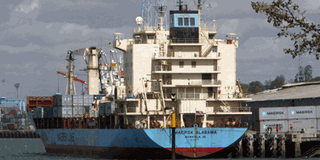US warships track hostage-holding pirates

The US-flagged Maersk Alabama container ship is seen docked at the Kenyan coastal sea port of Mombasa, 500 km (311 miles) from the capital Nairobi, April 12, 2009. A lifeboat used by Somali pirates holding a US merchant marine captain Richard Phillips captive drifted toward Somalia's lawless coast on Sunday, with US warships tracking it to keep the pirates from escaping to shore. REUTERS
MOGADISHU, Sunday
US warships tracked a boatload of gunmen holding a US ship's captain hostage off the Somali coast on Sunday and unidentified military helicopters flew over the pirate lair of Haradheere.
The gunmen were in a lifeboat out of fuel and drifting towards land, U.S. military officials said. If it reached shore, they might try to escape with their hostage, the officials said.
The US-flagged Maersk Alabama container ship was attacked far out in the Indian Ocean on Wednesday but its 20 American crew apparently fought off the pirates and regained control.
Relatives said merchant marine Captain Richard Phillips, 53, volunteered to go with the pirates in a Maersk Alabama lifeboat in exchange for the safety of his ship and its crew.
The four Somali pirates holding him want $2 million ransom and a guarantee of safe passage.
The incident has sharpened international attention on the growing problem of piracy in the busy sea lanes of the Gulf of Aden and the Indian Ocean.
Phillips is just one of about 270 hostages from around the world being held by pirates, who have targetted vessels from oil tankers to luxury yachts.
Three U.S. warships including the destroyer USS Bainbridge were in the area around the lifeboat on Sunday.
Military officials said the pirates fired on a U.S. craft that approached them from the Bainbridge on Saturday. No one was hurt and the craft withdrew.
Helicopters also flew over a coastal area used by pirates as a base on Sunday.
Residents said they could see white soldiers on one of two helicopters which flew over for around half an hour in the area of Haradheere port on Somalia's Indian Ocean coast.
They said they believed the helicopters came from nearby U.S. or other foreign warships. One helicopter briefly landed.
Resident Ahmed Haji Abdi said people were afraid of being bombed.
"We thought there would be air raids this morning. Haradheere is full of pirates," he said. "They might be Americans. They have left now."
It was unclear if the helicopters were sent to intimidate the pirates on land or as some step in a mediation process.
Pirates have various bases around Haradheere, and are holding some hijacked vessels in the area.
Bad memories
The Maersk Alabama, which was carrying thousands of tons of food aid for Somalia, Uganda and Kenya, arrived safely in the Kenyan port of Mombasa on Saturday.
"The captain is a hero," one crew member shouted from the 17,000-ton ship as it docked. "He saved our lives by giving himself up."
The standoff has forced US President Barack Obama to focus on a place most Americans would rather forget. A US intervention in Somalia in the early 1990s was a disaster, including the "Black Hawk Down" battle in 1993 that killed 18 US troops and inspired a book and a movie.
John Reinhart, president of Maersk Line Ltd, said the FBI was investigating the hijacking in Kenya.
"Because of the pirate attack, the FBI has informed us that this ship is a crime scene," he told reporters.
Somali elders sent a mediator on Saturday in the hope of resolving the situation.
"They are just looking to arrange safe passage for the pirates, no ransom," said Andrew Mwangura, coordinator of a regional group that monitors piracy.
The mediator took to sea in a boat but it was unclear how he planned to reach the pirates.
On Saturday, pirates captured an Italian-flagged tugboat towing two barges with 16 crew including 10 Italians in the Gulf of Aden. Pirates are keeping about 17 captured vessels on the Somali coast, six of them taken in the last week alone.
The foreign minister of Somalia's fledgling government said the piracy could only be stopped with stability and security onshore, not by foreign navies patrolling the sea.
"We can certainly resolve (piracy) in partnership with the international community. Our first priority is to re-establish the rule of law. For that, we have requested from the foreign community assistance to build our security forces," Foreign Minister Mohamed Abdullahi Omaar told Reuters.




